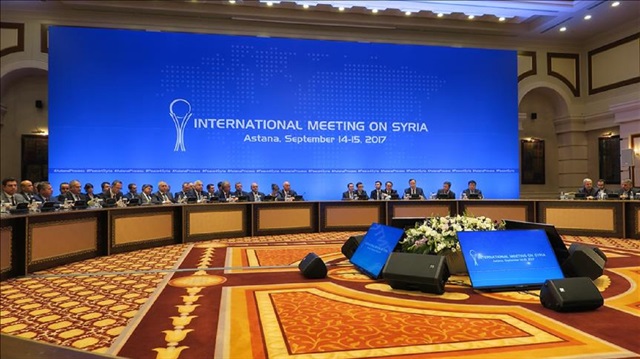
Brokered by Turkey, Russia, and Iran, talks will address strengthening cease-fire, release of captives, hostages
The seventh round of peace talks aimed at ending the Syria conflict began Monday in Kazakhstan’s capital Astana.
The talks, which will focus on strengthening the cease-fire that came into effect on Dec. 30, are brokered by Turkey, which backs the opposition, and Russia and Iran, who support Bashar al-Assad’s regime.
The two-day meeting will also address the release of captives and hostages, and humanitarian action on mines.
The Turkish delegation will be chaired by Deputy Foreign Undersecretary Sedat Önal, while Special Envoy for Syria Alexander Lavrentiev will lead the Russian team and Deputy Foreign Minister Hossein Jaberi Ansari will head Iran’s delegation.
Representatives of the Syrian regime, armed opposition groups, as well as delegations from the UN, Jordan, and the U.S. will attend the talks.
Monday's bilateral and multilateral talks will have a closed-door format, and a plenary meeting is scheduled for Tuesday.
During the talks, the participants will also discuss expanding the number of observer states in the Astana process, to include such states as Iraq and China.
Russian Foreign Minister Sergey Lavrov previously said he believed that it would be "useful" to expand the number of observer countries.
According to Syrian opposition sources, a delegation headed by Ahmet Barri, a Free Syrian Army commander, will present four documents to the UN about violations of the cease-fire, the situations of hostages, massacres by the Assad regime and Iran-supported militias, and the reshaping of Syria's ethnic makeup by Iran and the terrorist PKK/PYD.
The Russian delegation will raise the issue of establishing a "national reconciliation committee" among the Syrians.
During the previous meeting in September, the parties in Astana agreed to the boundaries of the final de-escalation zone in the northern Syrian province of Idlib.
At the fourth meeting in the Kazakh capital on May 4, the three guarantor countries first signed a deal to establish the zones.
Syria has been locked in a vicious civil war since 2011, when the Assad regime cracked down on pro-democracy protests with unexpected ferocity. Since then, hundreds of thousands of people have been killed in the conflict, according to the UN.
Hello, the comments you share on our site are a valuable resource for other users. Please respect other users and different opinions. Do not use rude, offensive, derogatory, or discriminatory language.
The floor is all yours.









